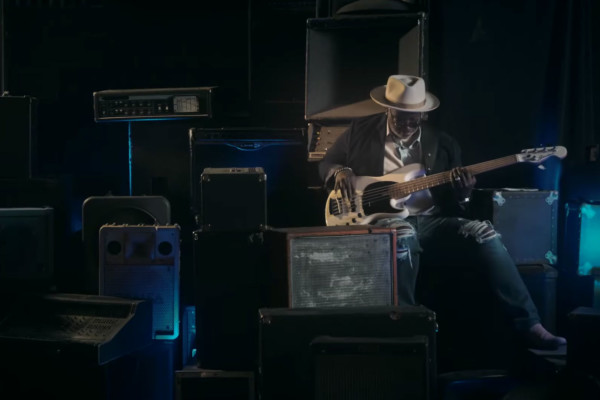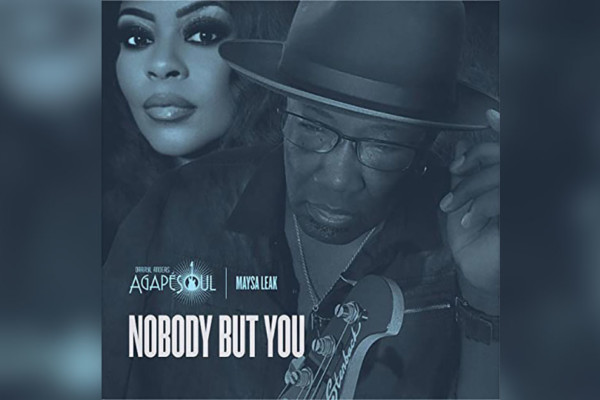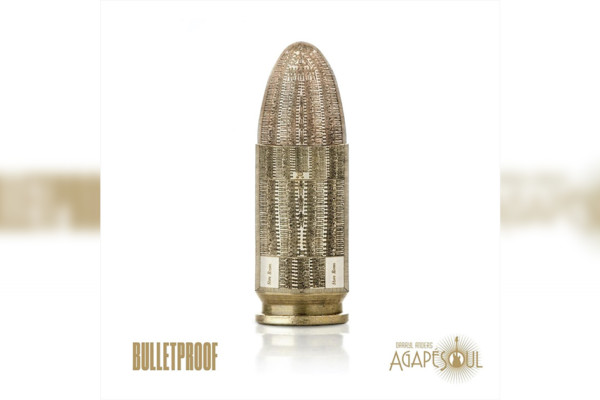Conversations: An Interview with Darryl Anders
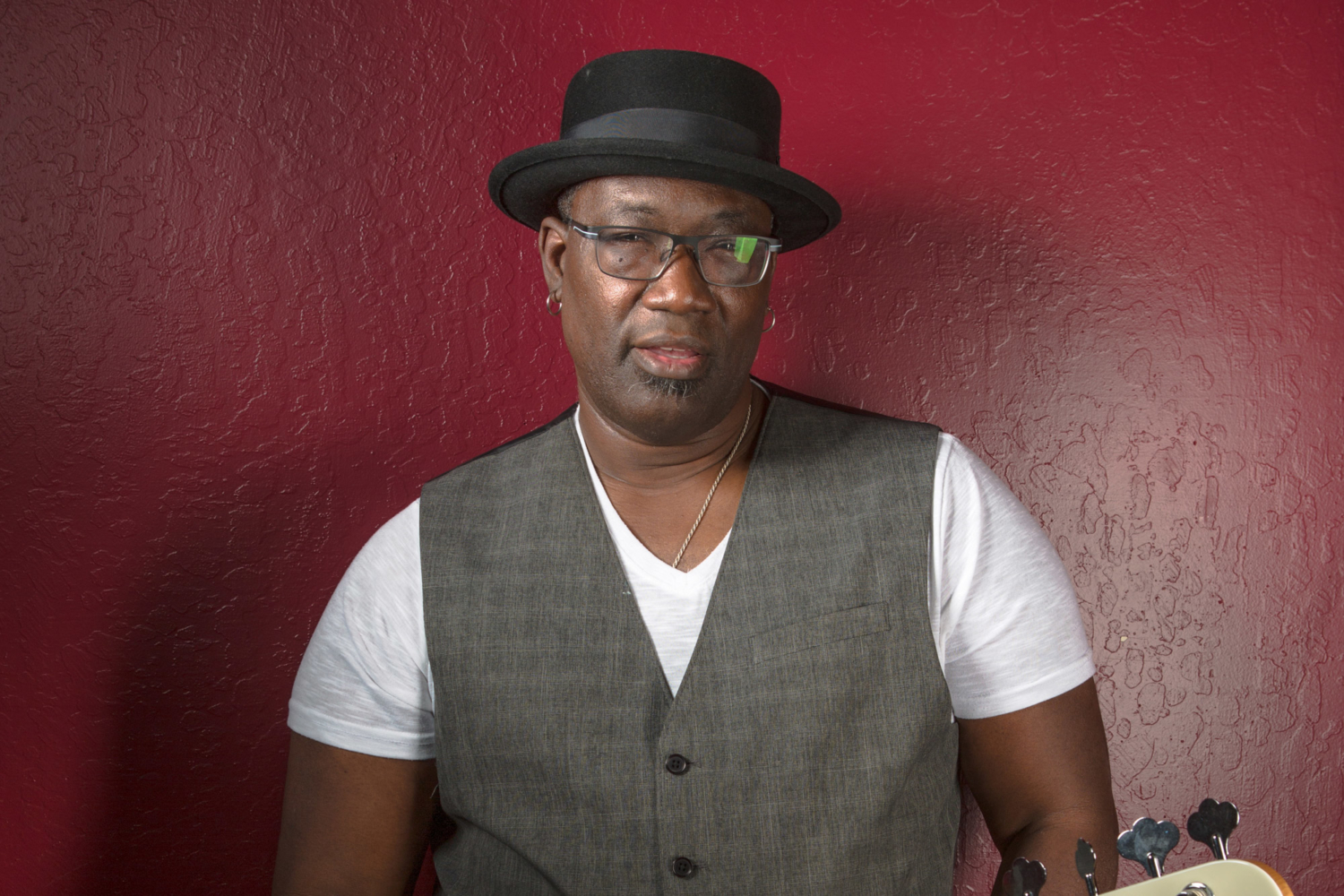
Agapésoul has just released their sophomore album, Conversations, featuring a host of guest artists supported by a core group of musicians. In the center of that core is bassist and bandleader Darryl Anders.
Originally from Florida, Anders grew up in a musical family and picked up the bass after starting on trumpet in third grade. One listen to the monster bass lines of Louis Johnson on the Quincy Jones record Mellow Madness was enough to cement his musical direction. He joined the Air Force and was stationed in the Bay Area where he now calls home. “There is a big musical vibe here in San Francisco and Oakland,” he explains. “There wasn’t a great music scene where I’m from originally. Here, there are all these great musicians that I’ve looked up to all my life.”
The region provided Anders some great opportunities for his own playing, as well. He’s performed with Tower of Power, Booker T. Jones, Zigaboo Modeliste of The Meters, and more. Millions of people have played along with Anders as he played bass and produced games for the popular Guitar Hero, Rock Band, and Karaoke Revolution game series. He also works in the music industry as the bass product manager for Dunlop.
Spending so much time in the studio for the games led to the bassist starting on his own music. The first Agapésoul album, Believe in Love, was released in 2012 and reached the top of the soul charts in the UK. Shortly after its release, Conversations has also hit number one. We caught up with Anders to get the scoop on the album.
What is the concept of the album? I know it’s been in the works for a few years and a lot has changed in that time, which leads me to believe it has to do with our current social environment.
 There definitely was some of that involved in it. The concept for the record, which I’ve had for a while, is the whole idea that music is a conversation. It’s the conversation that we have as musicians with the listener; it’s the conversation that we have with each other on stage, and it’s the conversation that we have in life as humans. Whether those conversations are person to person, text messages, or phone calls, there should be listening and a response. The way that we communicate can change things. I ultimately wanted to have something that was positive. Right now we’re in a very dark place in our country’s history, I think. Seeing all the negativity on the news every day, I wanted to make something that made people feel good.
There definitely was some of that involved in it. The concept for the record, which I’ve had for a while, is the whole idea that music is a conversation. It’s the conversation that we have as musicians with the listener; it’s the conversation that we have with each other on stage, and it’s the conversation that we have in life as humans. Whether those conversations are person to person, text messages, or phone calls, there should be listening and a response. The way that we communicate can change things. I ultimately wanted to have something that was positive. Right now we’re in a very dark place in our country’s history, I think. Seeing all the negativity on the news every day, I wanted to make something that made people feel good.
Even one of the saddest songs on the record, “The Lesson”, is a song about heartbreak, but it’s from the perspective of someone that is breaking your heart. You always hear about the person who gets the broken heart, but this is from the person who says, “I know this is wrong, but…” When I first heard that song, it tore me apart. Geoffrey Williams is one of my favorite songwriters, so getting him to sing on his own song with our version was cool, too.
You’ve got a lot of great guests on this album. Who else do you have?
I was very blessed and very fortunate to have some of my favorite musicians join me. Eric Gales is all over this record. Ivan Neville, Paul Jackson Jr., the guys from Snarky Puppy… Tommy Sims is one of the most incredible bass players, songwriters, and producers that you will ever hear in your life. He wrote, “If I Could Change the World” for Eric Clapton and produced records for Clapton, Springsteen, Michael McDonald, and more. He’s just a ridiculously talented guy. His first album is the blueprint for everything I’ve done. He’s one of my biggest musical mentors, so to have him on the record is like the greatest joy of my life. He does the voiceover in “Conversations” and that’s him singing “Home”.
What was the writing process like? How much is collaborative?
Some of the songs are ones that I wrote. “Think About It” is one of mine that is really old – maybe 20 years old. It fits where we are right now. “Think About It” was kind of a throwaway song when we started recording. We had already started “Changes” and “The Way That We Love”, which is written by the singer in the band, Zoe Ellis. I thought, “Well, I’ll bring this song that we can learn quickly and see what happens.” It turned out great.
I wanted this record to be more collaborative because it’s part of the whole conversation. Zoe wrote “Changes” and “The Way That We Love”, but I wanted it to sound like an AgapéSoul song, so we did certain things to make it fit this band. This is the first time we wrote together. The very first song on the record is called “Kite” that we wrote together for my wife. “Home”, which is also for my wife, was written together, too. I was having a big writer’s block at the beginning of the album so I had Zoe help me write it. We talked about some conceptual stuff and she ended up writing most of the song. She’s someone that I really respect as a songwriter. Her style is different from mine, which is good. When you write by yourself you are limited to yourself. I wanted to break out of my own box so we worked together.
We have a couple of covers, too. I believe you have to have one cover on the record. As a relatively unknown band, people have to have something to judge you by, and that’s easier if you know the song. Our covers were [The Ohio Players’] “Sweet Sticky Thing” and “The Lesson”, but “The Lesson” is a real obscure cover unless you’re a fan of English soul. Not a lot of people here would know that record, but he’s one of my favorite songwriters. His version of the song is much different. You should check it out. It’s just his voice, upright bass, and drums. There’s no harmonic stuff going on other than that. I wanted to capture that vibe in my version but make it an R&B soul song. That’s part of why I asked him to sing it because his delivery is mind-blowing.
This is the second time you have an album charting number one on the UK Soul charts. That’s pretty crazy.
Yeah, that is pretty crazy. I think Europeans appreciate music in a different way. I think they appreciate music where people are thinking about the craft of the song. It’s not just something with four chords and the same lyrics over and over. There is songcraft in this album. I grew up listening to great songwriters. My dad used to rave about Burt Bacharach and his songwriting. I’ve always been more about the song than anything. That’s part of the philosophy of this album, too. I keep telling everyone it’s not a bass player record. I don’t anyone to hear this and just say, “Oh, the bass sounds great on this.” I want people to go, “Wow. That’s a great song,” or “That made me feel something.” I want my music to make people feel something. It doesn’t have to be what I want it to be. I just try to create emotional landscapes.
I think that comes across. You do have a great tone, but you really keep your playing to a support role. The only time you are in the forefront is the solo in “The Way That We Love,” which is a poignant bass break.
Thank you. I didn’t want to do that – the band made me. I said, “Why don’t we just get a horn solo,” but they said I should do it since it is my band. I said, “No one wants to hear a bass solo.” [laughs] I’m also not really a solo guy. For me to do a solo, I have to figure out a way to tell a story and not take away from what’s there. I want to play just enough to be interesting and then go into the next part.
“Fruitvale Gumbo” had some killer playing on it, too. Fruitvale is a neighborhood in Oakland, right?
Fruitvale is the name of a street, and it’s kind of a neighborhood. The idea of that song was to combine Oakland, New Orleans, and Minneapolis. Oakland is about the band and New Orleans is because I played for Zigaboo for years and I love that town. I added Levi Seacer, who was the guitar player and musical director for New Power Generation for years. He’s the guitar player on “Sexy Mofo” and was in Prince’s band for ten or twelve years. He’s from Richmond, but he has that Minneapolis sound, so I wanted to mix those three things up and make something fun.
The other thing is that if you’ve ever been to New Orleans and seen a Second Line, you know it can start anywhere. You could be cooking in your house and then you’ll hear all these horns and instruments coming down the street getting closer and closer. It’s kind of raggedy with all these different rhythms but it works together. As it gets closer, it gets in you and you just have to stop what you’re doing and participate. That’s what I wanted it to sound like. At the end it gets quiet and then the horns start building up. It just sounds like the beginnings of a party. I got to have my friends from Snarky Puppy in there, which was great. Mike “Maz” Maher on trumpet, Chris Bullock on sax, and Nate Werth did the majority of the percussion on the record.
What kind of gear were you using on this?
It was really simple. I played a passive, five-string Stenback bass on the majority of the record. I also used my Mike Lull DA5 on a couple tracks. Everything was run through the Jule Monique preamp, and that’s it. Two basses and one preamp direct to Pro Tools.
That’s interesting, considering you’re a guy that is so well versed in effects and works with them daily.
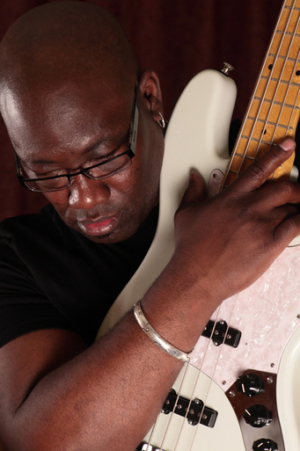 Again, it was about the song. None of these songs required anything extra. For me, effects are like colors on a palette. As I said, it was really important for me to not make this a bass player record. That meant not doing anything that would take away from the song. There were a few tracks where I redid my bass part several times because I kept taking things away. If a note got in the way of the melody or destroyed the mood of the song, it’s gotta go.
Again, it was about the song. None of these songs required anything extra. For me, effects are like colors on a palette. As I said, it was really important for me to not make this a bass player record. That meant not doing anything that would take away from the song. There were a few tracks where I redid my bass part several times because I kept taking things away. If a note got in the way of the melody or destroyed the mood of the song, it’s gotta go.
It takes humility to sculpt away at your lines that way.
In the process of making this record, I had people coming in a playing stuff that sometimes worked and sometimes didn’t. If it wasn’t what I wanted, I would just try something else. My guitar player and engineer said I was like the black Donald Fagen. But I applied that same principle to myself – if I played something that wasn’t right, I’d have to play it over or fix it. I came close to getting another bass player on some stuff because I wasn’t playing what I was looking for.
What’s coming up next for you? Will you be doing any touring?
That’s the plan. We’re booking a bunch of stuff now and we’re doing the CD release party in November. We’re hoping to get over to London sometime soon. I’d also like to do another record. This is our second record and I feel like I’m much better at it than I was the first time. It’s what I love to do, and now I have a team. My guitar player mixed and co-produced the record with me. Zoe and I have a great time writing together. My drummer is like an extension of me. So we have a core group of four people that made this a lot of fun.

